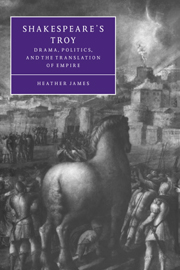Book contents
- Frontmatter
- Contents
- List of illustrations
- Acknowledgements
- Introduction: Shakespeare's fatal Cleopatra
- 1 Shakespeare and the Troy Legend
- 2 Blazoning injustices: mutilating Titus Andronicus, Vergil, and Rome
- 3 “Tricks we play on the dead”: making history in Troilus and Cressida
- 4 To earn a place in the story: resisting the Aeneid in Antony and Cleopatra
- 5 Cymbeline's mingle-mangle: Britain's Roman histories
- 6 “How came that widow in?”: allusion, politics, and the theater in The Tempest
- Notes
- Index
- Cambridge Studies in Renaissance Literature and Culture
3 - “Tricks we play on the dead”: making history in Troilus and Cressida
Published online by Cambridge University Press: 29 October 2009
- Frontmatter
- Contents
- List of illustrations
- Acknowledgements
- Introduction: Shakespeare's fatal Cleopatra
- 1 Shakespeare and the Troy Legend
- 2 Blazoning injustices: mutilating Titus Andronicus, Vergil, and Rome
- 3 “Tricks we play on the dead”: making history in Troilus and Cressida
- 4 To earn a place in the story: resisting the Aeneid in Antony and Cleopatra
- 5 Cymbeline's mingle-mangle: Britain's Roman histories
- 6 “How came that widow in?”: allusion, politics, and the theater in The Tempest
- Notes
- Index
- Cambridge Studies in Renaissance Literature and Culture
Summary
The previous chapter argued that the gory, idiosyncratic Titus Andronicus inaugurates Shakespeare's career-long engagement of the translation of empire and that his aberrant reproductions of classical icons should be recognized as calculated assaults on the political program invested in transporting imperial authority from Rome to Elizabethan England. Titus Andronicus' eccentric rhetoric and dramaturgy raise questions about the successful transmission of imperial authority through classical myth and example, which the play gleefully strips of their competence. The legends, icons, and models that Titus once took to be reliable sources of cultural nourishment turn out to be enervated metaphors for values they have come not to betoken but betray. As signs pried loose from their original contexts, Astraea and such once-reputable exemplars as Virginius and Lucrece, Vergil and Horace no longer anchor the Romans to their civic origins and defining virtues. With long histories and impressive credentials, these exemplars are cultural giants and tower over Titus Andronicus as claimants to fame. Yet Titus reduces them to media and not sources of authority, mere allusions to a ghostly past and their earlier, more famous appearances. Shakespeare's next exploitation of the resources of combative imitations comes not in Rome but at the originary site of the translatio imperii: “In Troy, there lies the scene” (1.1.1).
Long before Shakespeare turned to the matter of Troy, poets and historians alike had voiced skepticism about the relationship of the Troy legend to political propaganda. In cantos 33–5 of the Orlando furioso, the knight Astolfo makes his extraordinary voyage to the moon, where he is taken on a tour of the lunar junkyard by none other than the Apostle John. There, Astolfo receives an astonishing lesson in history:
- Type
- Chapter
- Information
- Shakespeare's TroyDrama, Politics, and the Translation of Empire, pp. 85 - 118Publisher: Cambridge University PressPrint publication year: 1997

